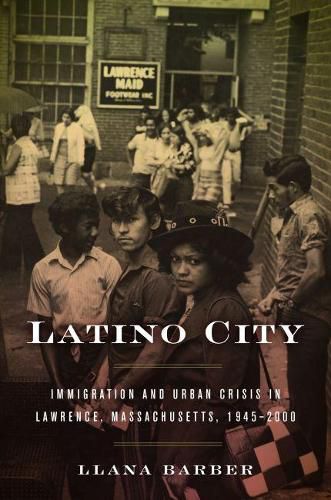Readings Newsletter
Become a Readings Member to make your shopping experience even easier.
Sign in or sign up for free!
You’re not far away from qualifying for FREE standard shipping within Australia
You’ve qualified for FREE standard shipping within Australia
The cart is loading…






By 2000, Lawrence, Massachusetts, became New England’s first Latino-majority city, and Latinos-mainly Dominicans and Puerto Ricans-currently make up nearly three-quarters of its population. Like many industrial cities, Lawrence entered a downward economic spiral in the decades after World War II due to deindustrialization and suburbanization. Latino immigration in the late twentieth century brought new life to the struggling city, but settling in Lawrence was fraught with challenges. Facing hostility from their neighbors, exclusion from local governance, inadequate city services, and limited job prospects, Latinos fought and organized for the right to make a home in the city.
In this book, Llana Barber interweaves the histories of U.S. urban crisis and imperial migration from Latin America. Pushed to migrate by political and economic circumstances shaped by the long history of U.S. intervention in Latin America, poor and working-class Latinos then had to reckon with the segregation, joblessness, disinvestment, and profound stigma that plagued cities during the crisis era, particularly in the Rust Belt. For many Puerto Ricans and Dominicans, there was no
American Dream
awaiting them in Lawrence; instead, Latinos struggled to build lives for themselves in the ruins of industrial America.
$9.00 standard shipping within Australia
FREE standard shipping within Australia for orders over $100.00
Express & International shipping calculated at checkout
By 2000, Lawrence, Massachusetts, became New England’s first Latino-majority city, and Latinos-mainly Dominicans and Puerto Ricans-currently make up nearly three-quarters of its population. Like many industrial cities, Lawrence entered a downward economic spiral in the decades after World War II due to deindustrialization and suburbanization. Latino immigration in the late twentieth century brought new life to the struggling city, but settling in Lawrence was fraught with challenges. Facing hostility from their neighbors, exclusion from local governance, inadequate city services, and limited job prospects, Latinos fought and organized for the right to make a home in the city.
In this book, Llana Barber interweaves the histories of U.S. urban crisis and imperial migration from Latin America. Pushed to migrate by political and economic circumstances shaped by the long history of U.S. intervention in Latin America, poor and working-class Latinos then had to reckon with the segregation, joblessness, disinvestment, and profound stigma that plagued cities during the crisis era, particularly in the Rust Belt. For many Puerto Ricans and Dominicans, there was no
American Dream
awaiting them in Lawrence; instead, Latinos struggled to build lives for themselves in the ruins of industrial America.